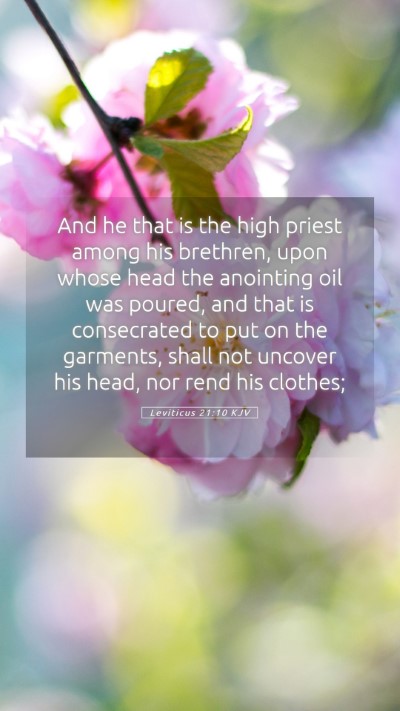Bible Verse Commentary on Leviticus 21:10
Leviticus 21:10 reads: "And he that is the high priest among his brethren, upon whose head the anointing oil was poured, and that is consecrated to put on the garments, shall not uncover his head, nor rend his clothes."
Understanding the High Priest's Role
The verse addresses the high priest's responsibilities, emphasizing the sacred nature of his office. According to Matthew Henry, the high priest, as the leader of the spiritual community, is set apart and should maintain a demeanor of reverence and dignity at all times. This is underscored by the significance of the anointing oil, which symbolizes divine appointment.
Importance of the Anointing Oil
Albert Barnes notes that the anointing oil represents the Holy Spirit’s blessing and empowering presence. Therefore, the high priest, having been consecrated with this oil, must act in a manner reflecting this divine relationship. He is not to show signs of grief typically expressed by tearing clothes or uncovering his head, as this would signify a lack of faith in God’s sovereignty.
Maintaining Holiness
Adam Clarke elaborates on the implications of holiness required from those in significant spiritual positions. The high priest's attire and behavior embody the holiness and separateness from worldly concerns. Clarke highlights that the garments worn by the high priest are not merely ceremonial but are integral to his identity and role within the community.
Implications for Contemporary Readers
The insights derived from this verse provide significant implications for modern believers. Bible verse interpretations suggest that those in spiritual leadership must model integrity, reverence, and stability in times of turmoil. This maintains the sanctity of their positions and provides a godly example to the congregation.
Bible Study Insights
Engaging with Bible study insights is crucial for comprehending the depth of Leviticus 21:10. Here are some Bible study lessons that can be drawn:
- Holiness in Leadership: Leaders in faith must understand their calling is a divine appointment.
- Expressing Grief: While it's normal to express distress, leaders should focus on divine control even in personal loss.
- Significance of Rituals: Understanding ceremonial acts can deepen appreciation for spiritual practices.
Relevant Cross References
This verse can be linked to several similar teachings throughout the Bible:
- Exodus 28:2-3: Details on the priestly garments, signifying the sacred role of priests.
- 1 Peter 2:9: Discusses all believers as a chosen people, calling them to live set apart.
- Hebrews 5:4: Explains that no one takes this honor upon themselves but is called by God.
Conclusion
In conclusion, understanding Scripture in light of Leviticus 21:10 teaches the importance of maintaining holiness and integrity in spiritual leadership. With its historical context and spiritual significance, this verse remains a guide for both ancient believers and modern Christians alike.
For anyone exploring the meaning of Bible verses, this verse serves as a profound reminder of the weight of spiritual responsibility and the call to live an exemplary life in dedication to God's service.


